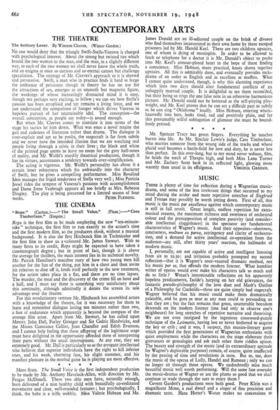CONTEMPORARY ARTS
THE THEATRE
The Solitary Lover. By Winston Cleeves. (Winter Garden.) No one would deny that the triangle Swift-Stella-Vanessa is charged with psychological interest. About the strong but twisted ties which bound the two women to the man, and the man, in a slightly different way, to each of the two women we shall never know the whole truth, and an enigma at once so curious and so eternal cannot but challenge speculation. The strategy of Mr. Cleeves's approach to it is shrewd and persuasive. Swift, a man who in practice finds it hard to forgo the ambience of petticoats though in theory he has no use for the attractions of sex, emerges as an uncouth but magnetic figure, the workings of whose increasingly distracted mind it is easy, though not perhaps very exciting, to follow ; we can see how Stella's passion has been atrophied and yet remains a living force, and we can understand the compulsion of hunger which drives Vanessa in hopeless pursuit of her unattainable idol. The conception—the overall conception, as people say today—is sound enough.
But when Mr. Cleeves comes to translate it into terms of the stage his tactics let him down. What was once a novel retains the gait and cadences of literature rather than drama. The dialogue is over-explicit and apt to be prolix, the stagecraft is far from subtle and we never have the intended illusion that we are watching real people living through a crisis in their lives ; the black and white of the printed page seems to leave no room for the grey half-tones of reality, and Mr. Wolfies sturdily theatrical production, though it has its virtues, accentuates a tendency towards over-simplification. The acting is vigorous. Mr. Wolfies personality has about it a certain inner robustness which fits awkwardly into the character of Swift, but he gives a compelling performance. Miss Rosalind Iden manages the frigid tenderness of Stella very well ; Miss Patricia Jessel rides the tempest of Vanessa's passions with accomplishment and Dame Irene Vanbrugh appears all too briefly as Mrs. Rebecca Dingley. The play is being presented for a limited season of four


































 Previous page
Previous page